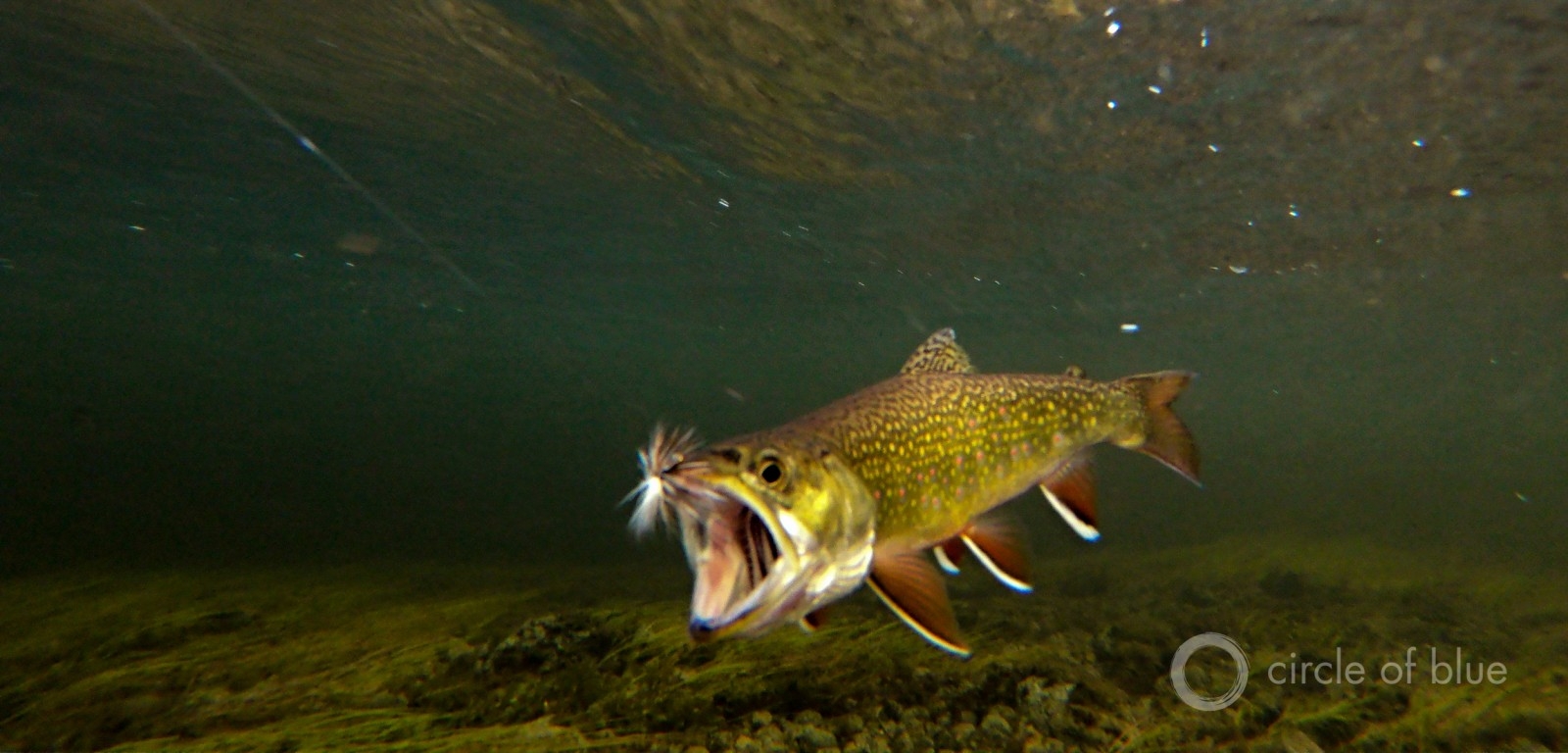The Stream, December 13, 2023: An Ancient Fishing Practice in Japan, with Cormorants and Fire, Is Being Lost to Environmental Change

Much of the Au Sable’s trout population has fled to the river’s tributaries, instinctively searching for oxygen-richer waters. Photo © J. Carl Ganter / Circle of Blue
YOUR GLOBAL RUNDOWN
- Lithium deposits beneath heritage farms in Portugal are sparking tension between proposed mines and growers, with groundwater caught in the middle.
- Just months after tremendous storms killed hundreds in the Democratic Republic of the Congo, torrential rain again fell on the country earlier this week.
- In Japan, ukai, an ancient method of fishing with trained cormorants and fire, is fighting for survival amid hot rivers and changing seasons.
- The Navajo Nation are resisting a proposed, massive hydropower project in Arizona, which they say will adversely affect their own ability to source water.
A new report from the International Union for Conservation of Nature (IUCN) suggests that nearly a quarter of the world’s freshwater fish may be at risk of extinction.
“Ensuring freshwater ecosystems are well-managed, remain free-flowing with sufficient water, and good water quality is essential to stop species declines and maintain food security, livelihoods and economies in a climate-resilient world.” — Kathy Hughes, co-chair of the IUCN Species Survival Commission Freshwater Fish Specialist Group.
Of the world’s nearly 15,000 species of freshwater fish, more than 3,000 were identified as at risk for extinction, the IUCN has found. The conclusion came as the body earlier this week released the latest Red List of Threatened Species, which indicates global plant, animal, and fungi species conservation statuses.
At least 17 percent of at-risk freshwater fish are affected directly by climate change, the report said. Some 57 percent were affected by pollution, and 45 percent by dams and water extraction.
Per the IUCN, more than a quarter of the 157,190 assessed species are at risk of extinction.
— Christian Thorsberg, Interim Stream Editor
Recent WaterNews from Circle of Blue
- The Year in Water, 2023 — Scenes from the Great Acceleration
- Push to Turn Farm Manure into Renewable Energy Draws Concerns — Billions in Taxpayer-funded incentives for new, loosely regulated U.S. energy sector.
The Lead
A 1000-year-old fishing tradition is at risk in Japan’s Nagara River, as environmental changes continue to disrupt the vibrant yet fragile practice, Reuters reports.
Between May and October, fishers head to the river with their fishing partners – specially trained cormorants. Baskets of flames are flung onto the river, causing small, sweet fish called ayu to jump near the surface. The cormorants catch them in their mouths, then release the fish into buckets. Increasingly, tourists watch the unique method from riverside inns and boats.
But these days, the spectacle is abbreviated. Unpredictable weather, including heavy rains and flooding, has made the river harder to read. The construction of flood barriers, over time, has caused ayu to become smaller. And water temperatures have reached nearly 90 degrees Fahrenheit, an unprecedented level and one in which ayu have greater difficulty surviving.
All of these factors have made fishing significantly harder. The ayu economy, once vibrant enough to support many livelihoods, is now threatened. Only 50 fishers remain in Japan, and many are unsure if the next generation will — or can — continue the practice into the future.
This Week’s Top Water Stories, Told In Numbers
14
Number of people known to have been killed earlier this week in the eastern city of Bukavu in the Democratic Republic of the Congo, as torrential rains triggered landslides and the collapse of homes, Reuters reports. Those living in poorer communes were most vulnerable, the mayor said. The disaster comes after heavy rains fell on the country this past May, killing more than 400 people.
126,000,000,000,000
Gallons of water a proposed hydropower project in Black Mesa, Arizona would require, The Guardian reports. The project is being pushed by a “self-described jet-setter” and French millionaire, Denis Payre, and his company, Nature and People First. The Navajo Nation, the main opponents, say that Payre is certainly not living up to his company’s name, and that they have been left out of discussions for the project, which would affect their own water availability, land, plants, and cultural resources.
On the Radar
One of Europe’s largest lithium deposits sits underground, beneath northern Portugal’s “centuries-old and ‘globally important’ farming system that combines agricultural biodiversity, resilient ecosystems and a valuable cultural heritage,” Mongabay reports.
The element is crucial for the transition to clean energy, and companies are urging the Portuguese government to issue mining licenses for the area. Should the government, which sees the potential for a $9 billion euro investment, choose to declare lithium mining in the public interest, residents could be forced out of their lands in favor of opening these mines.
Such a decision would come at the cost of livelihoods, natural landscapes, flora, and ancestral water systems, mine opponents say. Water defenders are especially concerned about the consequences for groundwater and rivers. “The company will consume more water in a day than the entire municipality in a month,” Armando Pinto, the head of the anti mining group Montalegre com Vida, told Mongabay.
More Water News
Emperor Penguins: Scientists studying emperor penguins last year in Antarctica, where sea ice melted much earlier than usual, observed four of five total penguin colonies lose all their chicks, Yale Climate Connections reports.
Aral Sea: In Uzbekistan, the last surviving generation of fishers on the Aral Sea — once the world’s fourth-largest body of water, before nearly disappearing — revisit their former freshwater landscape, AP reports.
Christian Thorsberg is an environmental writer from Chicago. He is passionate about climate and cultural phenomena that often appear slow or invisible, and he examines these themes in his journalism, poetry, and fiction.







Leave a Reply
Want to join the discussion?Feel free to contribute!